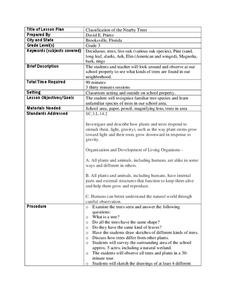Curated OER
Classification/Taxonomy/Statistics Review
"Does King Phillip Cry Over Flimsy Grass Stems?" You might not answer that question with this exhaustive worksheet, but your biology class will get the full scoop on the hierarchy of biological classification with this resource. It...
Curated OER
Pair the Plants: An Introduction to Scientific Names
Students examine why plants have both common and scientific names, then complete the activity by matching each common plant name with its scientific name. They finish by working in cooperative groups to create an ABC of Plants class book.
Curated OER
Introduction to Classification
Fourth graders design a classification system to categorize animate and inanimate objects. They discuss the advantages of grouping things as they classify buttons, leaves, shells.
Curated OER
Classification of Cerealites
Students create a dichotomous key. In this categorizing lesson, students create a dichotomous key for different types of cereal. Students classify the cereal into groups such as flakes and cereal with holes. Students discuss their...
Curated OER
Classification of the Nearby Trees
Third graders practice using classification techniques to identify local trees. In this plant life instructional activity, 3rd graders discuss how trees differ from other plants and what characteristics are unique to trees alone....
Curated OER
Animal Classification
For this animal classification worksheet, students read for information and comprehension. In this fill in the blank and multiple choice worksheet, students answer five questions.
Curated OER
Big Cat Classification
First graders discover the different names and classifications of big cats by using word processing applications. In this animal life lesson, 1st graders investigate one big cat and create a database of facts about it using an word...
Curated OER
Species Diversity in Ecosystems with Different Techniques of Land Management
Students visit numerous places to help in their understanding of Ecology. For this biology lesson plan, students will learn about characteristics and how to identify numerous plants and animals. This lesson allows for many field trip...
Curated OER
Introductory Bacteria and Virus Worksheet
Compare and contrast eukaryotes, prokaryotes, and viruses with a chart and a Venn diagram. Beginning microbiologists consider motility, reproductive ability, DNA content, and the presence of organelles. They write short answers to...
Illinois Department of Natural Resources
Section One: What is Biodiversity?
Four intriguing and scientific activities invite learners to explore the natural resources of their town. The activities cover concepts such as genetic traits, organizing species in a taxonomy, the differences between different species...
Curated OER
Marshland Ecosystem
Students classify animals based on their physical characteristics and eating habits. In this animal identification lesson plan, students investigate the life forms shown on a Parisian ceramic basin, and discover ecosystem the...
Curated OER
Animals Vocabulary Maze
In this animal vocabulary instructional activity, students read the clue and answer it with an animal vocabulary word and then find the word in the maze. Students complete 14 questions.
Curated OER
Animal Diversity
Students explore biology by completing science worksheets in class. In this animal anatomy lesson, students read the book The Adventures of Marco and Polo and identify the animals mentioned in it. Students examine a real life animal and...
Curated OER
Who's Who?
Students explore biology by identifying animals and their environments. In this animal characteristic lesson, students read assigned text about farm animals, how they are raised, and what they are used for in our society. Students view a...
Curated OER
Camouflage
First graders learn how plants and animals adapt to their environments. In this camouflage lesson plan, 1st graders watch a movie that explains animal camouflage, design a butterfly that blends into a classroom habitat, create a...
Curated OER
Classify That!
Students get acquainted with diverse forms of life by using modern biological classification systems to group animals that are related. They explore basic scientific groupings like genus, species, mammals, fish, birds, amphibians, and...
Curated OER
Classifying Living and Non-Living Objects
Students investigate living organisms and define the properties of a living species. In this life characteristic lesson, students examine plants in their class and discuss whether or not they are alive. Students create a...
Curated OER
Sunflowers, The Circle of Life
Learners investigate and observe plants and animals in nature. They find out how life cycles are present in much of nature. Students use appropriate graphic organizers for information gathering. Learners use sequence life cycles of...
Curated OER
Home Sweet Home
Students examine the change in the diversity of animals living in an area before and after development. In order to do this, students need to have access to an area near their school which is undeveloped. A good, "real life" lesson.
Curated OER
Big Cats Sounds
Students explore the sounds of big cats. In this animal science activity, students listen to the sounds of the big cats, such as lions and tiger, on a suggested website. Students research how the big cats use their sounds and write a...
Curated OER
Catch as Catch Can
Students investigate insects. In this insect analysis lesson, students catch insects using nets they make. They identify the insects they catch and create a chart to show the numbers and varieties. This lesson includes a vocabulary list...
Curated OER
Sponges - A Coloring Worksheet
In this sponges worksheet, students read the information about sponges. Students answer the provided questions about the reading passage. Students color the illustration at the bottom of the page.
Curated OER
Holy Habitats or Meet Metamorphosis
Students examine the metamorphosis of frogs and how it adapts to its environment. They research how world pollutants are effecting the amphibian population.
Curated OER
The Life Cycle of the Mealworm
Fourth graders provide a habitat for live mealworms and observe their life cycle. In this animal life cycle and scientific inquiry lesson, 4th graders create a habitat for a live mealworm and observe and record related data as it grows....

























